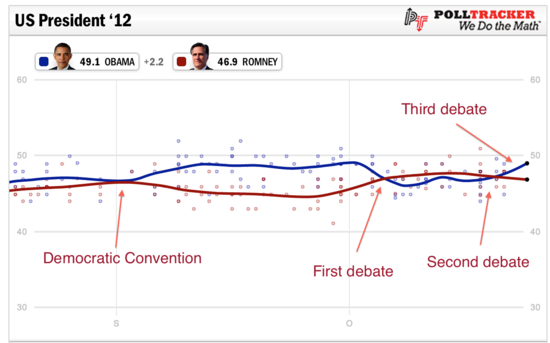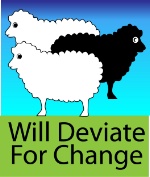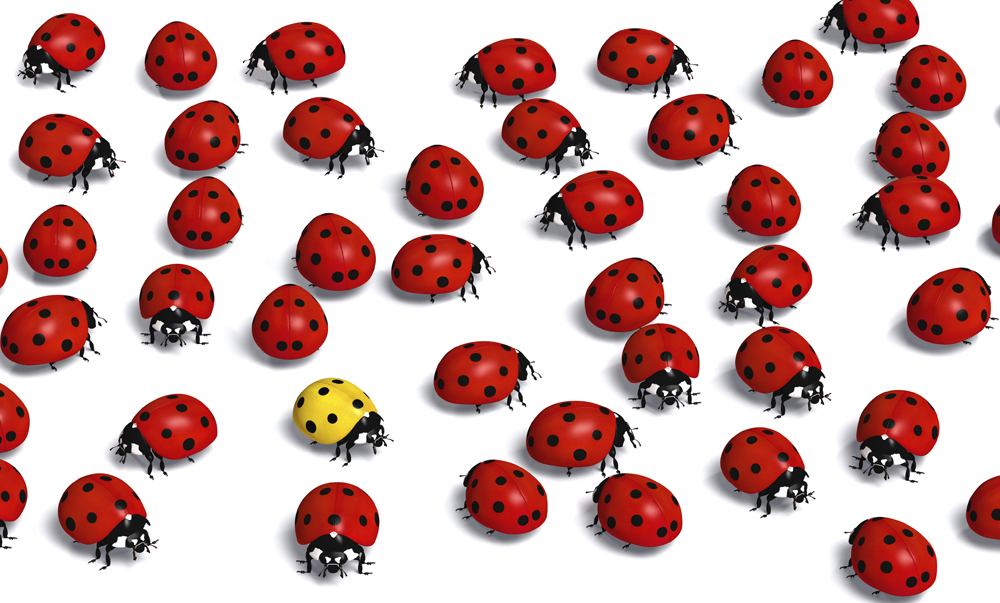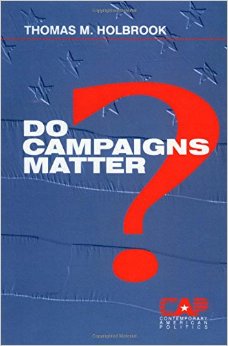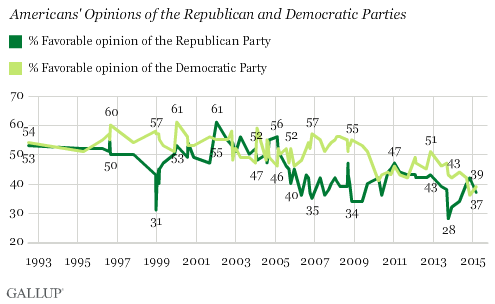
by Alex Patton | May 26, 2015 | Political Research
An astute listener to the radio show, the Ward Scott Files, that deals with political strategy and polling asks, “What causes bumps in polling?”

Bumps in Polling
Often after a candidate announces they are running for President, or after a major party’s political convention or some other major event, we will observe a bump in polling numbers. In most cases, if we wait several weeks, the bump will disappear.
What are we actually observing with these “bumps” in polling numbers?
In an attempt to further answer the question, I came across a paper, “The Mythical Swing Voter” by Andrew Gelman, Sharad Goel, Douglas Rivers, and David Rothschild of Columbia University, Stanford University and Microsoft Research.
Political scientists have debated whether swings in the polls are a response to campaign events or are merely reversions to predictable positions as voters become more informed about the candidates (page 2)
The paper follows an interesting methodology in that it conducted 750,148 interviews with 345,858 unique respondents on the X-box gaming platform during the 45 days preceding the 2012 Presidential election – creating a large on-line panel for studying shifts.
What is interesting is that the data showed with demographic adjustments, the data reproduced swings found in media polls during the 2012 campaign. HOWEVER, if we don’t use demographics, but instead use partisanship and ideology “most of the apparent swing in voter intention disappear.”
What the authors found was selection bias playing a role in the “bumps” candidates receive after a large announcement, meaning certain groups of people were much less/more likely to participate in a survey, and if we correctly estimate voters using items other than demographics, most of the apparent swings were sample artifacts, not actual change.
Only a small sample of individuals (3%) switched their support from one candidate to another.
We estimate that in fact only 0.5% of individuals switched from Obama of Romney in the weeks around the first debate, with 0.2% switching from Romney to Obama.
Conclusion(s)
The paper’s authors conclude “that vote swings in 2012 were mostly sample artifacts and that real swings were quite small.”
In today’s highly polarized partisan politics, the percentages of the Mythical Swing Voter is much smaller than polling would indicate.
Meaning, there is little to no actual bump or people switching sides – there is more of a selection bias in the polls. “The polls do indeed swing—but it is hard to find people who have actually switched sides.” (page 2)
The temptation to over-interpret bumps in election polls can be difficult to resist, so our findings provide a cautionary tale. The existence of a pivotal set of voters, attentively listening to the presidential debates and switching sides is a much more satisfying narrative, both to pollsters and survey researchers, than a small, but persistent, set of sample selection biases.

by Alex Patton | May 7, 2015 | Political Consulting, Political Research
I anticipate some blow-back on this blog post, but “since my intent is to write something useful to whoever understands it, it has appeared to me more fitting to go directly to the effectual truth of the thing than to the imagination of it” (Machiavelli 61).
In a previous post, we dared to ponder the question, “Do political campaigns really matter?” We looked at the curious case in Alachua County where two Republican campaigns were run in the same election cycle – one campaign was essentially a name placed on the ballot; the other campaign was a robust campaign. We observed a mere 2.2% difference in the results. We also took note of the complete dominance of the Democratic Party in Alachua County elections.
Hegemony: leadership or dominance, especially by one country or social group over others.
But we also noted the recent success of more conservative members of the Gainesville City Commission – arguably the most conservative commission in 15 years.
How do we reconcile these two things and what can we gleam from the situation in regards to campaigns and politics?
The Search for Positive Deviance

The Search for Positive Deviance
Anytime we start a new analysis, we look to see if anyone has already done the work and we look for positive deviance.
Positive deviance (PD) is an approach to behavioral and social change based on the observation that in any community, there are people whose uncommon but successful behaviors or strategies enable them to find better solutions to a problem than their peers, despite facing similar challenges and having no extra resources or knowledge than their peers. These individuals are referred to as positive deviants Wikipedia – positive deviance
We had mentioned before, that since 2002, 4 Republicans have won Alachua County in county-wide, partisan races.
Let’s examine these campaigns:
| year |
race |
winner |
winner% |
| 2010 |
USSEN |
Rep |
40.01% |
| 2010 |
CC4 |
Rep |
54.03% |
| 2006 |
AGR |
Rep |
51.46% |
| 2004 |
Sheriff |
Rep |
51.84% |
In the 2010 USSEN race, Senator Marco Rubio was the top voter in a three way race. So, our first strategy would be to split the hegemony’s power with a two way split. For now, we table that suggestion.
In the 2010 County Commission race, Republican Susan Baird defeated long time incumbent and current Democrat county chair, Cynthia Chestnut.
In 2006, long time incumbent Republican Agriculture Commissioner Charles H. Bronson beat unknown Eric Copeland after Copeland switched from a CFO campaign after fellow Democrat Alex Sink got into the CFO campaign. (You knew Copeland was in trouble when he launched his Agriculture Commissioner campaign with “The incumbent has done an adequate job representing the interests of Agriculture in Florida.”)
In 2004, long time incumbent Republican Steve Oelrich beat neophyte challenger Bill Davis for Alachua Sheriff.
If we look for positive deviance in all three of these victories, we see the Democrats fielding poor candidates, neophyte candidates or in the case of Cynthia Chestnut – fielding a candidate that did not campaign at all.
However, the one thing the above three positive deviances share : the Democrats screwed up. (It is not my intention to take away from the Republican campaigns because they had to be in a legitimate position to take advantage of the Democrats’ mess up.)
If we also consider the Mayor’s race of 2013, when Republican Ed Braddy beat Democrat, incumbent Craig Lowe, we see a similar event – the Democrats screwed up.
So, we have identified a second strategy : field good, legitimate Republican candidates and hope and pray the Democrats screw up.
But there is another item the winning campaigns share which brings us to the third and I believe the most important strategy: the political environment was formed before the campaigns ever took place.
If we reconsider the case of Craig Lowe, we can observe a series of events that happened well before his re-election campaign ever started.
Criag Lowe’s first term was highlighted by:
Another local example is the biomass issue. Nathan Skop based his campaign on the disaster that is the GREC biomass contract. He is a subject matter expert and foretold all the calamity barreling towards Gainesville. Skop was right on the issue, but lost the campaign. Why? The political environment had not been formed successfully – yet. As the issue matured and macerated, the City of Gainesville has witnessed significant political change on the City Commission.
Yet another local example is from 10 plus years ago with the fight against Alachua’s comprehensive plan – Lee Pinkoson and Cynthia Chestnut were successful in ousting two incumbents because the political environment had been formed before they entered the campaign.
This is the recipe for success! I can tell you from experience; a lot of people aren’t going to like the taste.
The Recipe for Success
The time voters are most open to persuasion is during non-campaign contexts.
These elected officials must never have a week off. These elected officials must have every move examined with a ruthless intensity and an inexorable contrasting of values. The critique must be unrelenting, and the criticism must garner press coverage. The effort required is a long, uncivil, and confrontational process; it requires resources.
The goal is to drive the negatives of those in power to as close to 50% or higher or strategically place them on the wrong side of public opinion on issues – before any Republican campaign comes into a nascent state.
Here is the catch: There are virtually no organizations or groups willing to pay the price to do what must be done for the length of time it must be done. Not many people or organizations will risk the press labeling them malcontents or gadflies or uncivil.
Not many people are willing to be the “bad guy” for anything other than a single issue and a short period of time.
The political party can not take the lead role, because they minute they take the lead, the issue becomes partisan and it forces voters put on their partisan, team jerseys. The critique must be received before voters put on their partisan jersey because once the critique is perceived as purely partisan, the critique will not be considered. The party and politically partisan groups can play a supporting role.
The local ‘advocacy’ business groups will not play this natural role because they fear retribution and risking their prestigious goodwill. These groups continue to attempt to play an apolitical role in a political system and continue to believe politics is a genteel exercise in rationality that can be massaged and performed outside the public arena. These advocacy groups must understand the role of Solomon can be effectively played only when there are two competing sides presenting.
Political change is not rational, genteel, private nor delicate; it is the opposite.
Conclusion
To review the possible strategies:
- Do nothing and accept the status quo.
- Field good Republican candidates and force three way contests with liberals being 2/3 of the candidates.
- Field good Republican candidates and wait for the Democrats to screw up.
- Put in the long, controversial work needed in the form of a permanent campaign in order to form the political environment well before candidate campaigns start.
I have been espousing this recipe for several years because I believe in seizing one’s own fate. I have discussed these ideas with other political experts in depth and they agree with the recipe. So far the idea has been considered offensive and met with scorn.
I realize this recipe is controversial, but again my goal is to write something useful, not imaginary. To change the hegemony, a “political bad guy” must operate 365 days a year.
Said nicely: To make change permanent, there must be a competing viewpoint offered on a permanent, consistent and unrelenting basis. In order to do it correctly, there must be a institutionalized effort comprised of people that do not fear retribution.
Any community that desires change in a hegemony does a tremendous disservice to any candidate when they complain behind closed doors only or speak up 6 weeks before election day.
The heavy lifting and dirty work must be done before and outside candidate campaigns – after all, even Jesus needed John the Baptist to lay the groundwork for his work to be successful.

by Alex Patton | May 1, 2015 | Political Consulting

Why in the world would a campaign consultant ask the seemingly heretical question, “Do political campaigns really matter?”
The answer: partially purposefully provocative combined with another part intellectual curiosity, but as we prepare to spend billions of dollars to elect our next President, we should explore the question.
The Interesting & Peculiar Case of Alachua County
As a political operative in a Democratic dominated area, I’ve run multiple campaigns in this Democratic stronghold of a county. I have the scar tissue to prove it.
Active Registered Voters as of:05/01/15
- Democrats:74,076
- Republicans:45,165
- Others:39,406
- Total:158,647
Knowing the odds, I’ve often wondered what would happen if one Republican candidate ran a campaign and one Republican didn’t. Would it matter? Interestingly, Alachua County was presented with that scenario in 2014.
Peculiar Case of the Alachua 2014 Tax Collector Campaign
In 2014, Alachua County experienced the most gentle and amiable campaign maybe ever witnessed by mankind.
In this year, Alachua County held a partisan, open election for Tax Collector. Both candidates seemingly made a gentleman’s agreement not to say anything other than complimentary things about one another. For campaign operatives used to mixing it up, this campaign was an anathema.
Jon C. Costabile’s, the Rep, total expenditure was $11,770.00.
Summary of campaign : He qualified by petition. He put up some signs, printed small runs of campaign literature, and repaid close to $6,500 in candidate loans.
John Power’s, the Dem, total expenditure was $32,466.00.
Summary of campaign: He printed some palm cards, put out some signs, sent 2 mail pieces, paid qualifying fee and repaid $6,000 in candidate loans.
Tax Collector Campaign Summary
| Name |
Party |
Tot. Exp |
Total Vote |
% Vote |
| Jon Costabile |
REP |
$11,770.00 |
30,864 |
41.15% |
| John Power |
DEM |
$32,466.00 |
44,145 |
58.85% |
It is truly difficult to describe just how much of a non-event, non-campaign this was. Both candidates were genuine friends, and the entire campaign consisted of “I would like the job, but if my opponent is elected, it’s cool.” The campaign had little to no media coverage, little to no actual campaigning.
In summary, the Republican spent a little over $5,000 in a county-wide, partisan race.
While boring and bewildering, this campaign provides a unique case study getting to the question of “In Alachua County, if a Republican candidate does little more than put their name on the ballot, what % of the vote would they obtain?”
In a sense, this 2014 tax collector campaign provides the baseline for Republican candidates in Alachua County.
Campaign Comparison
At the exact same time in 2014, Alachua County had a hotly contested County Commission race between Republican John Martin and Democrat Ken Cornell. These two guys were the antithesis of the tax collector race. They did comparing and contrasting media and for all intents and purposes both candidates ran robust campaigns.
John Martin’s, the Republican, total expenditure was $65,945.00
Summary of campaign: No primary, signs, mailers, tv, phone calls, newspaper.
Ken Cornell’s, the Democrat, total expenditure was $101,535.11
Summary of campaign: Contested primary campaign, mail, television, polling, campaign staff, radio
Because of the primary, we break out contributions and expenditures using the primary date as the demarcation line:
| Cornell $ |
Contributions |
Expenditures |
| Primary |
$56,605.81 |
$44,856.08 |
| General |
$55,332.50 |
$56,782.23 |
County Commission Campaign Summary
| Name |
Party |
Tot. Exp |
Total Vote |
% Vote |
| Jon Martin |
REP |
$65,945.00 |
32,769 |
43.35% |
| Ken Cornell |
DEM |
$101.535.11 |
42,816 |
56.65% |
So we are now able to compare and contrast the two types of campaigns during the same election cycle: no campaign versus a more robust campaign.
In a macro view and with a 6x difference in expenditure amount between the Republican candidates, what change in results do we observe between the non-campaign and the robust campaign? +2.2%.
Historical Comparison
Just to remove the doubt that there was something specific about these two campaigns, I also looked at ALL partisan, county wide races in Alachua County since 2002.
| Total Races |
46 |
| Rep Wins |
4 |
| Dem Wins |
42 |
Noting the differences between Presidential and Gubernatorial election years, we find:
|
Average Win % |
| Average Dem Pres Yr |
63.34% |
| Average Dem Non-Pres Year |
58.76% |
So we can observe these two campaigns are at the averages of all campaigns since 2002.
Conclusions / Questions
So have we definitively proved that campaigns don’t matter? No, I don’t think so. We can conclude that running Republican candidates county wide in Alachua County is extremely difficult regardless of the campaign.
But we aren’t the only ones asking the question. With the renewed focus on modeling and fundamentals, we see it all around us. Thomas Holbrook dared to ask the same question in his 1996 book “Do Campaigns Matter?” and David Farrell and Rudiger Schmitt-Beck dared to ask the same in 2002 with “Do Political Campaigns Matter? Campaign Effects in Elections and Referendum”
The debate rages on.
The political nerd term is “campaign effects”.
To unpack the effects of campaigns, it is helpful to think about when exactly campaigns matter. Two factors are paramount: the number of undecided voters and the balance of resources among the competing candidates.” – John Sides and Jake Haselswerdt, George Washington University
A summary of the findings? Campaigns do matter, when all things are equal, and campaigns matter at the margins.
Most importantly, we can take this knowledge and ask some additional questions:
Noting the recent success of Republicans / Conservatives in the City of Gainesville elections, how can we reconcile that success with elections in Alachua County?
If we can explore that question, then we will have the recipe to break inertia in Alachua County? (and I have my next blog post)
Next week : The Recipe for Success to Break Inertia in Alachua County for Republicans

by Alex Patton | Apr 27, 2015 | Political Consulting

First time candidates make mistakes, and it is because we expect them that we can take steps to minimize them.
Over the past 20 plus years, I have observed first candidates making mistakes early in the process and during a campaign.
This quick guide is an attempt to help first time political candidates avoid the most common campaigning mistakes, and it may act as a refresher for more experienced candidates.
PRE-CAMPAIGN LAUNCH MISTAKES
Not Doing Correct Research Before Declaring / Deciding to Run before Evaluating the Terrain
This maybe the single biggest mistake a candidate can make. I rue the phone calls that begin with “I’ve filed my paper work and I am running. I’d like to discuss it with you.” Too Late.
It is better to call with “I’m considering running for office, and I would like to discuss the decision making process with you.”
In politics timing is everything, and sometimes this just isn’t the time to be successful.
Mistaking your Friends for Voters
Your friends lie – not in a mean spirited way, but in a non-malevolent way that is crushing. Your friends like you and most likely think you would be a wonderful public servant. Your friends also most likely look like you, live near you, and share political opinions similar to yours.
But most importantly, your friends are NOT likely to say something to you that will test or risk your friendship.
Thinking Beating an Incumbent will be easy
Yes, you and your friends think the incumbent has done an awful job. (But we’ve already talked about your friends.)
Incumbents enjoy significant advantages over challengers and are extremely difficult to up-end. The base rate of success in the Congress? Less than 10%.
Not polling
Running for office without polling is like driving a car blindfolded.
One wouldn’t be as stupid to drive blindfolded, why would one ever consider running without objective research?
Research is the way to test your friends’ and the campaign’s critical assumptions.
Cost too much? Nope. Not in with advancement in technology.
Want to know what really costs too much? Running a losing campaign because the message was off or campaign strategy was based on erroneous assumptions.
Saying “They’ll Never Find It” when it comes to past events.
It will always be found!
In fact, sometimes your former spouse, former business partner, or just someone who doesn’t like you will gift-wrap and hand-deliver it.
Your supporters can forgive most things, but cannot and will not forgive being surprised.
CAMPAIGN MONEY MISTAKES
Underestimating the Time Needed for Fundraising
Underestimating the difficulty in raising money may be the second biggest mistake.
Raising money for political campaigns is hard. It takes as twice as much effort and time as a candidate thinks it will – especially first time candidates.
Your good friend who said you would make a great public servant will suddenly stop returning your calls. Others will terribly disappoint you.
Rule of thumb for first time candidates: I take whatever figure a first-time candidate tells me they can raise, and I cut it in half and then cut it half again. The result is the actual working budget until proven incorrectly.
Messing up the Money
Don’t ever, ever mess up the money. Make sure the campaign keeps impeccable records and hits all filing deadlines.
- Pro-tip – photocopy each and every check before depositing.
- Second pro-tip – no cash even if the law allows it.
Candidate fills days with campaign work because she is avoiding FR
A candidate can find an infinite amount of things to work on, but normally a candidate starts doing these things because they are avoiding fundraising.
If you are a candidate, sadly your first priority is the role of head fundraiser in charge. You must provide the fuel for the campaign to run well.
If you find yourself digging holes for signs, writing television/radio commercials or attending government meetings you are most likely avoiding fundraising.
Yes, fundraising is hard and grunt-like, but all candidates volunteer for it.
DURING CAMPAIGN MISTAKES
Being Cheap About Photos
Good photos are essential to your campaign.
Most people are visual. They learn visually, they are persuaded visually.
Just because your cousin has a smartphone camera doesn’t mean you get good photos.
Don’t be miserly, hire a great photographer.
Valuing Expert Opinion as Much as Your Cousin’s
If you hire a political consultant, please don’t weigh their opinion equally with your neophyte cousin.
It is always desirable to seek advice and counsel from multiple people, but when push comes to shove weight the expert opinion more than cousin Eddy’s novice opinion.
Getting Bored with the Message
Once your campaign researches and develops the message, repeat it until people scream – then repeat it more.
One of the biggest challenges for first-time candidates is they get bored with the message thinking everyone has heard it before. The reality? Most people don’t tune into the campaign until the final week / days.
The trouble begins when the candidate decides to talk about something new. All consultants can recall picking up a newspaper story about the campaign (maybe the only time the hometown paper profiles a candidacy) to read pontifications from a candidate never discussed or researched that does NOTHING to advance the campaign’s message.
Don’t do it. Repeat the message, repeat it until you get complaints, then repeat it more.
Mistaking Politics for Popularity
If a political candidate is attempting to be everything to every voter, the candidate is going to have a bad time.
In a political campaign, a winner needs just one more voter than 50%. As a political candidate, you will NEVER have all voters love you, so stop trying.
Acting like it all about the candidate – It’s not.
Campaigns are about the voters, not you.
Resumes rarely win campaigns.
A candidate needs to suspend somewhat of what brought you to the dance – the ego. Candidates need to position smack dab in the middle of what the voters want.
Winning the Argument is NOT the same as winning the Election
Yes, you can be right, but please not to the detriment of the campaign. If you are trying to win every single argument, every single time, reconsider.
Conclusion
While this list is not comprehensive of every campaign mistake first-time candidates can make, this guide does represent some of the most common mistakes made.
If you take away nothing else, please remember – do research before filing paperwork and don’t underestimate the amount of time needed in the fundraising department.
PS. Before you go, you may want to check out some additional free information for first-time candidates: Additional Reading for First Time Candidates

by Alex Patton | Mar 17, 2015 | Political Consulting
I am not an alarmist, nor would I be considered a chicken little. In fact, I tend to think systems self-regulate and maintain an equilibrium.
However, for the first time, I am starting to ponder is America’s current two party system heading towards collapse?
Complexity
Over the weekend, I made the mistake of peering down the rabbit hole of the study of complexity and complex systems.
My over-simplified definition of a complex system? A complex systems is comprised of many, diverse actors who have interdependent relationships providing feedback that operate in an adapting, ever changing landscape.
This field is study’s grandfather could be considered Thomas Schelling. His nobel prize winning economic work is summarized in Micromotives and Macrobehavior. You are familiar with his work if you have read Malcolm Gladwell’s Tipping Point.
A basic point is micro level behavior and preferences can and often will differ from macro level results. These macro level results “emerge” from the microlevel actors, meaning no central actor is conducting.
I think we all can agree, the american political system could be described as a complex system.
The Collapse of Complex Systems
When we look at complex systems, they are remarkably tolerant systems, because as we defined them, they adapt….to a point.
However, our current political system is suffering fundamentally in two requirements for a healthy complex system:
Diversity in a Complex System
One of the requirements of a complex system is diversity. Not diversity of just the commonly discussed race and gender, but diversity of thought.
Diversity is a sign of the robustness of a system and its ability to adapt.
Making the concept simple: the more robust (diverse) a system, the more likely of optimizing a outcome.
When a system is reduced to homogeneous actors, the system loses robustness and heads towards catastrophic failure.
An example is a lake.
A lake is a large, complex, diverse and robust system. You put nitrogen run-off into a lake, a lake can adjust and adapt. No big deal.
You continue to add more nitrogen, a lake will continue to adjust, but its diversity is being reduced. It is still a healthy lake, but the complex system is undergoing stress.
You continue to add nitrogen to a lake, and at some critical point there is little to no diversity and BAM! you hit a tipping point and we are left with a slimy mess, a eutrophic lake.
Feedback in Complex Systems
Complex systems have cascading effects leading to tipping points. One of those cascading causing effects is when feedback loops tip too far to positive only or negative only.
With the lack of diversity in both parties and the curating of news, we observe epistemic closure skyrocketing in our political system.
Epistemic closure is not new, it was first talked about in the 1960s. More recently David Frum, former Bush speechwriter, was warning us about closed feedback loops in 2010 in his NYT piece, Post-Tea-Party Nation.
We observe feedback loops becoming less diverse, reinforced with epistemic closure, further affecting the feedback loop. It is a death spiral.
Observation of Current System
We would be hard-pressed to find a single thinking American that is satisfied with the current state of America’s political system.
Currently, the American political system is undergoing the Big Sort. Our politics are becoming more partisan and each party is undergoing it’s own purge of diversity of RINOs and DINOs.
The political system is less diverse thanks to gerrymandered districts and ideological purges. The feedback loops are closing (if not closed for some) thanks to epistemic closure.
Both factors are accelerating to magnitudes we have not observed due to catalysts such as technology (Internet) and money (super PACS).
This is observed in Gallup’s recent findings that NEITHER the Democratic Party nor the Republican party exceeds a 40% favorability rating. This is a historical finding: BOTH parties have NEVER been below 40% at the same time in Gallup’s poll.

Conclusion
Another observation of change in complex systems and its modeling is the speed at which massive change happens.
Let’s return to the lake example. A little disfunction is tolerated, but once cascades happen the change is inexorable, and change happens with a violent suddenness. Recent examples? the fall of the USSR and the US financial meltdown.
The USSR and the world financial markets were both systems similar to the lake. You could observe the signs of stress, but no one predicted the rate or size of change.
The current system of 2 party dominance is under tremendous stress.
- Congress’ approval rating is near an all-time low of 15%.
- BOTH parties favorabilities are at historic lows.
- Citizens have lost faith in government’s ability to do its basic job.
When I look at our country’s current two party system, I see signs of collapse and cascades.
There are questions remaining:
- Can we interject enough diversity back into the complex system to increase the likelihood of the system adapting? I see little to no evidence of that.
- Have we already passed the tipping point towards collapse?
- If we have not reached a tipping point towards collapse, will the system adapt and experience a realignment like we have seen in the past? V. O. Key, Jr. wrote about such realignments – Whigs, FDR, Nixon, Reagan, etc.
- If we have reached a tipping point, what would a collapse of the current political system look like? A third party and the death of one or both of the established parties? A radical redesign of the governmental system towards a multi-party governance?
I have always tended to believe that our 200 year old system of government is extremely robust and will adapt. I have previously thought we could and should expect a realignment.
However, with the acceleration of purges and closed feedback loops, I fear the system is now barreling towards collapse.
What I am becoming is more convinced daily that our complex system of governance will undergo a massive change in a relatively short period of time.
This massive change will take the form of a major realignment of the two major political parties or a collapse of our governing system. I hope it is the first.
As with the assassination of Archduke Franz Ferdinand Duke leading up to World War 1, in complex systems, a small spark can cause a massive, cascading change.
One possible spark? The electoral college advantage of the Democrats leading to the election of Hillary Clinton to the Presidency of the United States.
Additional Reading on Complexity
Santa Fe Institute
